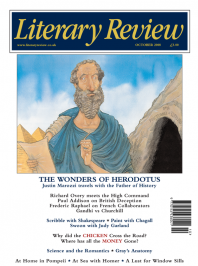Rachel Hore
Memory & Misery
The Beacon
By Susan Hill
Chatto & Windus 160pp £10
The misery memoir, the pundits tell us, is finally on the wane. The great dark tide of tales about childhood neglect and abuse, engendered by Frank McCourt’s Angela’s Ashes and Dave Pelzer’s A Child Called ‘It’ back in the mid-Nineties, has seemed unstoppable. It has been as though, to quote from Susan Hill’s disturbing new novella, ‘everyone in the world … had been beaten and starved and kept in the cold, every little boy had a cupboard under the stairs and every girl a locked cellar’. Now, it seems, our interest in ‘mis lit’ is abating, though not, one fears, for lack of new material.
What we hear little about is the family fallout from these public confessions, especially when, as in one or two recent cases, the stories turn out to be untrue or are seriously disputed. It’s a situation like this that Susan Hill explores in her beautiful, clean prose.
The Beacon is a farmhouse, long owned by the Prime family, though the land and animals have all been sold off. For many years, only old Bertha Prime and her eldest daughter May have lived there. May’s brother Colin and sister Berenice have homes nearby. Now Bertha lies dead upstairs,

Sign Up to our newsletter
Receive free articles, highlights from the archive, news, details of prizes, and much more.@Lit_Review
Follow Literary Review on Twitter
Twitter Feed
Russia’s recent efforts to destabilise the Baltic states have increased enthusiasm for the EU in these places. With Euroscepticism growing in countries like France and Germany, @owenmatth wonders whether Europe’s salvation will come from its periphery.
Owen Matthews - Sea of Troubles
Owen Matthews: Sea of Troubles - Baltic: The Future of Europe by Oliver Moody
literaryreview.co.uk
Many laptop workers will find Vincenzo Latronico’s PERFECTION sends shivers of uncomfortable recognition down their spine. I wrote about why for @Lit_Review
https://literaryreview.co.uk/hashtag-living
An insightful review by @DanielB89913888 of In Covid’s Wake (Macedo & Lee, @PrincetonUPress).
Paraphrasing: left-leaning authors critique the Covid response using right-wing arguments. A fascinating read.
via @Lit_Review